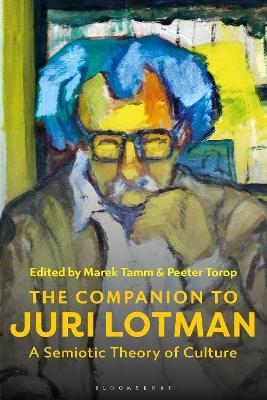
The Companion to Juri Lotman
Bloomsbury Academic (Verlag)
978-1-350-26819-7 (ISBN)
Boasting an interdisciplinary cast of academics from across the globe, the book is structured into three main sections – Context, Concepts and Dialogue – which simultaneously provide ease of navigation and intriguing prisms through which to view Lotman’s various scholarly contributions. Saussure, Bakhtin, Language, Memory, Space, Cultural History, New Historicism, Literary Studies and Political Theory are just some of the thinkers, themes and approaches examined in relation to Lotman, while the introduction and Lotman bibliography in English that frame the main essays provide valuable background knowledge and useful information for further research.
The Companion to Juri Lotman shines a light on a hugely significant and all-too often neglected figure in 20th-century intellectual history.
Marek Tamm is Professor of Cultural History at Tallinn University, Estonia. He has recently published Rethinking Historical Time: New Approaches to Presentism (ed. with Laurent Olivier, 2019), Juri Lotman – Culture, Memory and History: Essays in Cultural Semiotics (ed., 2019) and A Cultural History of Memory in the Early Modern Age (ed. with Alessandro Arcangeli, 2020). Peeter Torop is Professor of Semiotics of Culture at the University of Tartu, Estonia. He is Co-Editor of the Sign Systems Studies journal and the Tartu Semiotics Library book series.
List of Figures
Acknowledgments
Notes on Contributors
Introduction, Marek Tamm (Tallinn University, Estonia) and Peeter Torop (University of Tartu, Estonia)
1. Lotman’s Life and Work, Tatyana Kuzovkina (Tallin University, Estonia)
Part I. Lotman in Context
2. Lotman and Saussure, Ekaterina Velmezova (University of Lausanne, Switzerland)
3. Lotman and Russian Formalism, Mihhail Trunin (Tallinn University, Estonia)
4. Lotman and Jakobson, Igor Pilshchikov (Tallinn University, Estonia; UCLA, USA) and Elin Sütiste (University of Tartu, Estonia)
5. Lotman and Bakhtin, Caryl Emerson (Princeton University, USA)
6. Lotman and the Tartu-Moscow School of Semiotics, Merit Rickberg (Tallinn University, Estonia) and Silvi Salupere (University of Tartu, Estonia)
7. Lotman in Transnational Context, Igor Pilshchikov (Tallinn University, Estonia; UCLA, USA)
Part II. Lotman in Concepts
8. Language, Suren Zolyan (Immanuel Kant Baltic Federal University, Russia)
9. Text, Aleksei Semenenko (Umea University, Sweden)
10. Culture, Mihhail Lotman (Tallinn University and University of Tartu, Estonia)
11. Communication, Winfried Nöth (Catholic University of São Paulo, Brazil)
12. Modelling, Katre Pärn (University of Tartu, Estonia)
13. Narration, Wolf Schmid (University of Hamburg, Germany)
14. Space, Anti Randviir (University of Tartu, Estonia)
15. Symbol, Ilya Kalinin (Saint-Petersburg State University, Russia)
16. Image, Nikolay Poselyagin (National Research University Higher School of Economics, Russia)
17. Memory, Renate Lachmann (University of Constance, Germany)
18. History, Taras Boyko (University of Tartu, Estonia)
19. Biography, Jan Levchenko (National Research University Higher School of Economics, Russia)
20. Power, Pietro Restaneo (National Research Council, Italy)
21. Explosion, Laura Gherlone (National Scientific and Technical Research Council, Argentina)
22. Semiosphere, Peeter Torop (Tartu University, Estonia)
Part III. Lotman in Dialogue
23. Lotman and French Theory, Sergey Zenkin (Russian State Univresity for the Humanities, Russia)
24. Lotman and Deconstructionism, Daniele Monticelli (Tallinn University, Estonia)
25. Lotman and Cultural History, Marek Tamm (Tallinn University, Estonia)
26. Lotman and Literary Studies, Katalin Kroó (Eötvös Loránd University, Hungary)
27. Lotman and New Historicism, Andreas Schönle (University of Bristol, UK)
28. Lotman and Cultural Studies, John Hartley (Curtin University, Australia)
29. Lotman and Popular Culture Studies, Eva Kimminich (University of Potsdam, Germany)
30. Lotman and Media Studies, Indrek Ibrus (Tallinn University, Estonia) and Maarja Ojamaa (University of Tartu, Estonia)
31. Lotman and Social Media Studies, Mari-Liis Madisson (University of Tartu, Estonia) and Andreas Ventsel (University of Tartu, Estonia)
32. Lotman and Memory Studies, Nutsa Batiashvili (Free University of Tbilisi, Georgia), James V. Wertsch (Washington University in St Louis, USA) and Tinatin Inauri (Free University of Tblisi, Georgia)
33. Lotman and Political Theory, Andrey Makarychev (University of Tartu, Estonia) and Alexandra Yatsyk (University of Tartu, Estonia)
34. Lotman and Life Sciences, Kalevi Kull (University of Tartu, Estonia) and Timo Maran (University of Tartu, Estonia)
35. Lotman and Cognitive Neurosciences, Edna Andrews (Duke University, USA)
Lotman in English: A Bibliography, Remo Gramigna (University of Turin, Italy)
Index
| Erscheinungsdatum | 28.01.2022 |
|---|---|
| Zusatzinfo | 8 bw illus |
| Verlagsort | London |
| Sprache | englisch |
| Maße | 156 x 234 mm |
| Gewicht | 816 g |
| Themenwelt | Geschichte ► Teilgebiete der Geschichte ► Kulturgeschichte |
| Geisteswissenschaften ► Philosophie ► Erkenntnistheorie / Wissenschaftstheorie | |
| Sozialwissenschaften | |
| ISBN-10 | 1-350-26819-4 / 1350268194 |
| ISBN-13 | 978-1-350-26819-7 / 9781350268197 |
| Zustand | Neuware |
| Informationen gemäß Produktsicherheitsverordnung (GPSR) | |
| Haben Sie eine Frage zum Produkt? |
aus dem Bereich


